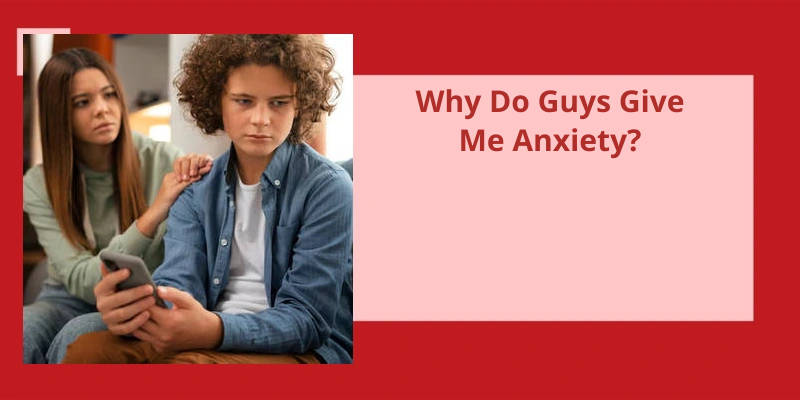It isn’t uncommon for individuals to experience anxiety in various aspects of their lives, and relationships with the opposite sex can certainly be one of those triggers. When it comes to the question of why do guys give me anxiety, there can be numerous factors at play. Certain behaviors exhibited by men may contribute to feelings of unease and apprehension, such as their tendency to be secretive about certain aspects of their life, resorting to physical intimidation, displaying mean-spiritedness, or using hurtful language. Moreover, there are instances where a partner's excessive behavior, regardless of it’s intention, can still instigate anxiety. While every individual's experience may vary, it’s crucial to examine these dynamics in order to better understand and address the underlying causes of anxiety in relationships with men.
Is It Normal for Your Partner to Make You Feel Anxious?
Constantly criticizing or belittling you. Flirting with others in front of you. Making you feel guilty or responsible for their emotional state. These actions can create a toxic and unhealthy environment, and it’s essential to address them.
It isn’t normal or healthy for your partner to make you feel anxious. Relationships should be based on trust, respect, and open communication. Feeling constantly on edge, questioning your worth, and fearing their reactions are signs of an unhealthy dynamic.
Anxiety is often a response to underlying issues within the relationship. It could stem from feeling inadequate or insecure due to the behaviors of your partner. The constant fear of not being enough or constantly walking on eggshells can take a toll on your emotional well-being.
It’s crucial to recognize these patterns and consider seeking professional help or talking to a trusted friend or family member. Building a support system can offer guidance and perspective outside of the relationship. Additionally, self-care practices such as therapy, mindfulness, and engaging in activities that bring you joy can help manage anxiety and improve your overall well-being.
Remember that you deserve to be in a loving and supportive relationship where you feel valued and secure. It may take time and effort, but advocating for your emotional well-being is essential. Dont be afraid to address your concerns with your partner or seek outside help if needed.
Strategies for Managing Anxiety in a Relationship
- Open and honest communication about anxieties and fears
- Setting realistic expectations for oneself and the relationship
- Practicing self-care and stress management techniques
- Identifying and challenging negative thought patterns
- Seeking professional help through therapy or counseling
- Developing coping mechanisms and relaxation strategies
- Building a support network of friends and loved ones
- Engaging in activities that promote overall well-being
- Creating a safe and supportive environment for oneself and partner
- Working on building trust and understanding in the relationship
It’s natural for anxiety to surface in relationships, particularly when there are worries or communication gaps. However, labeling it as inherently negative would be an oversimplification. Exploring the complexities of anxiety within a partnership helps navigate it’s impact on both individuals, fostering growth and understanding.
Is It Bad if Your Partner Gives You Anxiety?
Many people may wonder if it’s bad when their partner or significant other gives them anxiety. The truth is, anxiety in relationships is more common than we think. It’s not uncommon for individuals who’re prone to worrying or have difficulties communicating their emotions to experience anxiety in their relationships. However, it’s important to remember that anxiety doesn’t automatically equate to a bad thing in your relationship.
It shows that you’re emotionally invested and fear losing them, which is a natural response in many relationships. Understanding and accepting this aspect of anxiety can help you navigate it in a healthier way.
However, it’s important to assess the root cause of your anxiety. Is it because your partner is engaging in behaviors that are truly worrisome or harmful? Or is it because of your own insecurities and past experiences?
Communication is crucial when it comes to managing anxiety in relationships. Talking openly and honestly with your partner about your concerns and fears can help alleviate some of the anxiety. It allows both of you to gain a better understanding of each others perspectives and find ways to support each other through the anxiety.
Developing coping mechanisms and self-care practices can also be beneficial in managing anxiety in relationships. Engaging in mindfulness exercises, practicing self-compassion, and seeking professional help if needed can be instrumental in reducing anxiety levels.
It’s essential to work together as a team, communicate effectively, and prioritize self-care to navigate anxiety and maintain a healthy and fulfilling relationship.
Signs of a Toxic Relationship and How It Can Contribute to Anxiety.
In relationships, there are certain signs that indicate toxicity, which can greatly contribute to anxiety. One sign is constantly feeling on edge and anxious, always walking on eggshells around your partner. Another sign is frequent arguments that escalate into verbal or even physical abuse. Gaslighting is another toxic behavior where your partner manipulates you into questioning your own thoughts and feelings. These toxic dynamics can erode your self-esteem and create a constant state of anxiety. It’s important to recognize these signs and seek support in order to prioritize your mental well-being.
Source: 13 Tips From A Psychologist For When A Relationship Causes …
Dating can be an exciting but nerve-wracking experience, especially for those who struggle with dating anxiety. There are various reasons why dating men can make one anxious, such as negative past experiences and the fear of being judged. However, it’s essential to remember that it’s possible to overcome these anxieties by focusing on personal growth, improving communication skills, and cultivating self-love.
Why Does Dating Men Make Me Anxious?
Dating anxiety is a common experience for many individuals, especially when it comes to dating men. There can be multiple causes for this anxiety, including negative past experiences, fear of being judged, and the presence of other anxiety disorders. Negative past experiences, such as heartbreak or mistreatment, can cause a person to develop a fear of getting hurt again. This fear can manifest as anxiety when entering new romantic relationships.
Many individuals worry about what their potential romantic partner will think of them, leading to self-doubt and anxiety. This fear can be particularly pronounced if they’ve low self-esteem or have had experiences of being judged or rejected in the past.
Anxiety disorders can be triggered by various factors, such as a fear of embarrassing oneself or a fear of not meeting societal expectations.
Fortunately, there are coping strategies that can help alleviate dating anxiety. Working on oneself and developing self-confidence can be incredibly beneficial. Engaging in activities that promote self-growth and self-acceptance can boost self-esteem and reduce anxiety. Additionally, improving communication skills can also be helpful. Learning how to express thoughts and feelings effectively can reduce misunderstandings and anxiety in dating situations.
Lastly, it’s important to remember to love yourself as you are. Accepting yourself, flaws and all, can ease anxiety and increase self-worth. It’s essential to realize that being anxious about dating doesn’t make you any less deserving of love and happiness.
Dating Anxiety in LGBTQ+ Relationships
- Feeling anxious about starting a new relationship
- Worrying about how others might react to your LGBTQ+ relationship
- Fear of being judged or rejected because of your sexual orientation or gender identity
- Concerns about coming out to friends and family in the context of a romantic relationship
- Anxiety about finding acceptance within the LGBTQ+ community
- Worries about compatibility and long-term success in the relationship
- Fear of experiencing discrimination or mistreatment in public
- Struggling with self-confidence and self-esteem in the dating process
- Feeling pressure to conform to societal expectations or stereotypes
- Dealing with internalized homophobia or transphobia
- Anxiety about communication and navigating potential conflicts
- Concerns about safety and personal security in dating situations
Personal Incompatibility: Sometimes, anxiety can arise from a clash in values, personalities, or communication styles with a certain person, causing discomfort and tension. Insecurity or Low Self-esteem: Feelings of inadequacy or low self-worth can contribute to anxiety around someone who seemingly embodies qualities you feel lacking in. Intuition or Gut Feeling: Trusting your instincts is important, as they can alert you to potential threats or dangers, leading to anxiety in certain individuals’ presence. It’s crucial to identify the root causes of your anxiety around specific people to find ways to manage and alleviate it.
Why Do I Get Anxiety Around a Certain Person?
Unresolved Issues: If there are unresolved issues or unresolved emotions between you and a certain person, it can lead to anxiety. This could be due to unexpressed feelings, unresolved conflicts, or lingering tension. Lack of Control: Feeling powerless or unable to control the outcome of your interactions with a person can contribute to anxiety. If you feel like you’ve no control over how they perceive or respond to you, it can create a sense of unease. Insecurity: If you’ve insecurities or low self-esteem, being around a certain person who triggers these feelings can intensify your anxiety. You may worry about being judged, rejected, or not measuring up to their standards. Overthinking: Overanalyzing and overthinking interactions with a certain person can also cause anxiety. Constantly questioning your words and actions, fearing judgment or misinterpretation, can become mentally exhausting and anxiety-inducing. Lack of Trust: If you’ve a history of being hurt or betrayed by people, it can make it difficult to trust others. Being around a certain person may trigger anxiety because you’re hesitant to let your guard down and fear being hurt again. It’s important to remember that anxiety around certain people is a personal experience, and the reasons can vary greatly from person to person. Understanding and addressing the root causes of your anxiety can help you manage it more effectively and ultimately improve your overall well-being.
Environmental Triggers: Certain Environments or Circumstances in Which You Interact With a Certain Person Might Be Triggering Your Anxiety. For Example, if You Always Get Anxious When You Have to Speak in Public, Being Around Someone Who Makes You Feel Judged in That Situation Can Heighten Your Anxiety.
One reason why guys may give you anxiety is due to environmental triggers. These triggers can be specific environments or circumstances where you interact with them, which can often exacerbate your anxiety. For instance, if you already experience anxiety when speaking in public, being around a guy who makes you feel judged in that situation can intensify your anxiety levels.
It’s essential to address the source of your anxiety, whether it’s stemming from a partner or something else. Seeking treatment will allow you to find more peace and reduce constant feelings of unease. Two common approaches to anxiety treatment include online therapy and medication, often used in combination for maximum effectiveness.
What if My Partner Triggers My Anxiety?
If you find that your partner triggers your anxiety, it’s essential to recognize the impact it’s on your mental health. Relationships can be a source of stress and anxiety for many individuals, and it’s important to address these issues head-on. Understanding the root causes of your anxiety can help you navigate your emotions and find ways to cope with them effectively.
Seeking treatment for your anxiety is a crucial step in finding ways to cope with the triggers in your relationship. There are various treatment options available, and it’s important to find the one that works best for you. Online therapy can provide a safe and convenient platform to address your anxiety and relationship issues. A therapist can help you explore the root causes of your anxiety and develop coping strategies to manage it in a healthy way.
In some cases, medication may also be prescribed to help alleviate the symptoms of anxiety. However, it’s important to remember that medication should always be taken under the guidance and supervision of a healthcare professional. It’s also important to understand that medication alone may not address the underlying triggers in your relationship, so therapy can be a valuable component of your treatment plan.
Many individuals face similar challenges, and seeking help is a sign of strength. By addressing your anxiety and finding effective coping mechanisms, you can create a more supportive and harmonious relationship environment for yourself and your partner. Dont let your anxiety control your life, and take the necessary steps towards a healthier and happier future.
Communication Strategies for Addressing Anxiety Triggers in a Relationship
When it comes to addressing anxiety triggers in a relationship, communication strategies play a crucial role. Open and honest communication allows both partners to express their fears, worries, and concerns, creating a safe space for understanding and support. It’s important to listen actively and empathetically, acknowledging your partner’s anxiety without judgment. Offering reassurances and validating their feelings can go a long way in making them feel understood and loved. It’s also helpful to establish healthy boundaries and develop coping mechanisms together. Creating a plan or system for handling anxiety triggers can provide a sense of security and control, making both partners feel more at ease. Remember, addressing anxiety in a relationship requires patience, compassion, and a willingness to work together as a team.
Conclusion
While some guys may engage in secretive behaviors, physical intimidation, or use mean language, it’s important to remember that not all guys behave this way. However, certain characteristics, such as being excessively clingy or possessive, can also trigger anxiety. It’s crucial to evaluate toxic behaviors and establish boundaries in relationships. Remember, not all guys give anxiety, and developing healthy communication and mutual respect can help mitigate anxiety in relationships.






